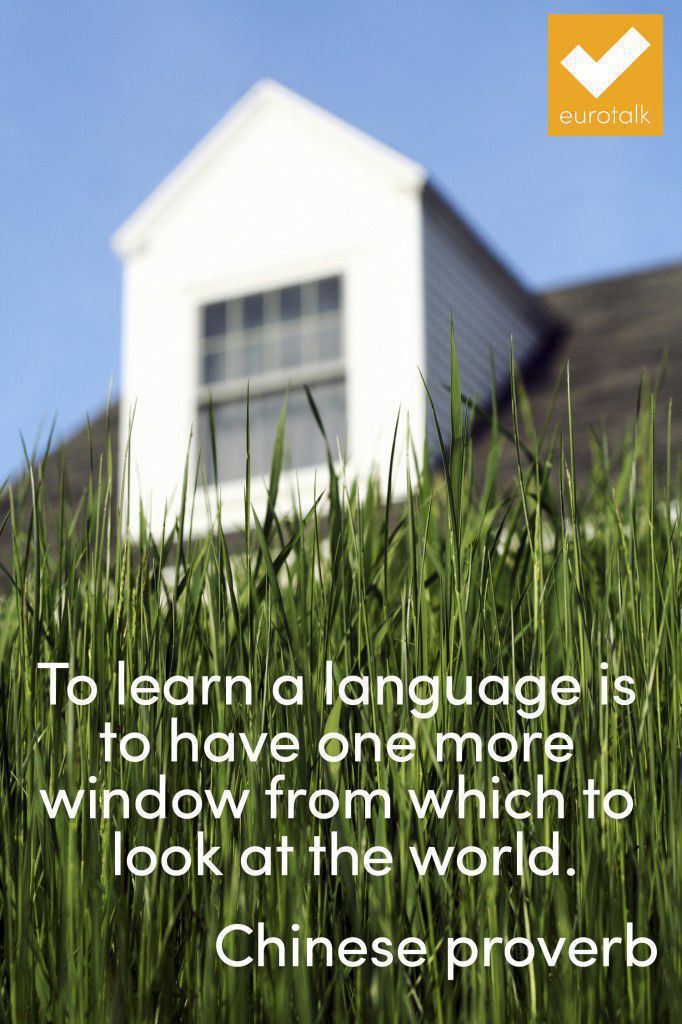Quote of the week: 14 Jun 2014
“To learn a language is to have one more window from which to look at the world.” Chinese proverb
For more like this, find us on Pinterest.
Embed This Image On Your Site (copy code below):
How learning a language can help your career
 “Learning a different language has made me the person I am today. I enjoy working with global brands in over 18 different countries, and leading a team specialised in 5 different markets.”
“Learning a different language has made me the person I am today. I enjoy working with global brands in over 18 different countries, and leading a team specialised in 5 different markets.”
Sarah works as a Multilingual Search Manager at Search Laboratory, and she’s taken time out to tell us why and how learning a language has helped her develop her career.
Q. Your experience of learning a language…
– When did you start?
I started learning another language at the age of seven, when my family moved to Germany. I often say that I learnt the language by watching TV, but it was actually a combination of listening (which did involve TV), reading (mainly as schoolwork gave me no choice – I wasn’t the bookworm then that I am today), and being thrown in the deep end. If there’s no other communication option around you, you will pick up a language. It just might take some time.
– How did you get into languages?
I got into it through video tapes for children designed to help learn a second language, and then through tuition and being surrounded by the language in everyday life. For the first six months of living in Germany I went to an English school, but then transferred to a German one, so speaking the language was a must for grades, making friends, and just generally communicating.
– What was hard?
The first few months were pretty tricky. I’m known as a bit of a chatter-box (this is likely to come across in my answers), so not being able to communicate was tough, but also an incentive to just try the language and learn by doing. The best way to learn a language is to speak it. It’s also the scariest thing about learning a language.
These days the main challenge is remembering the right word for the right language. With two languages buzzing in my head, I can often recall the perfect word for what I want to say, but in the wrong language for the situation.
Q. How you have found being multilingual useful when searching for employment and building a career?
 Being multilingual has been very useful for my career, as it’s given me more options, and I think it’s also helped me stand out a bit in the employment crowd. This was especially true when I was younger, and just starting out. Though multilingual isn’t as unusual as you think these days.
Being multilingual has been very useful for my career, as it’s given me more options, and I think it’s also helped me stand out a bit in the employment crowd. This was especially true when I was younger, and just starting out. Though multilingual isn’t as unusual as you think these days.
It was also a way for me to narrow down my career search. I knew that I wanted to be part of a company that provided opportunities for multilingual speakers, and was equally interested in different cultures and understanding different markets.
Q. How do you use languages in your everyday role as a Multilingual Search Marketing Manager?
I manage our French, Spanish, Italian, Russian and Chinese team, so the language alone doesn’t help out; however, the language experience is vital. I feel that because I went through learning a language and living in a different country that I’m more empathetic to and understanding of the struggles of day to day life (or at least some of them – the team may disagree).
I also think that the language experience has made me very inquisitive about other cultures, and languages, which really comes in handy when looking into the differences of search behaviour and trends in other markets.
Q. Why do you think more people should learn more languages?
Because it’s great fun! And because it can open up career opportunities that you hadn’t even thought of yet.
I sometimes forget that I’m classed as multilingual as having more than one language is natural to me, to my family, and most of the people I work with. I think I’d be pretty bored if I only had one language to rely on.
Also, looking back and seeing all the opportunities I might have missed out on, is a bit of a scary thought.
I’m excited to learn more languages, though can’t decide of the languages which my team speaks, which one to start with. There’s just too much choice!
Do you use languages at work? Have you found knowing more than one language has helped you in your career?
Why learn Mandarin Chinese?
In Europe and the United States alike, a growing interest in Mandarin Chinese is leading to big changes in public and private education, with various schools for adults and children now incorporating this language into their curriculum. Many parents are currently encouraging their children, aged as young as four or five, to learn Mandarin, in an attempt to boost their prospects in the face of an increasingly competitive workforce.
Chinese growth
Despite a marked increase in popularity of Mandarin Chinese, it is interesting to view a spate of news articles and blogs advising adults and children alike not to bother learning this challenging language. Fluency in this language is impossible, their authors say, without spending many years in China; Mandarin (which utilises over 2,000 characters) is too difficult to learn in one’s free time; the tonality of the language (an array of pitches are used to convey different meanings) is a hurdle most students will fail to overcome. Even eight hours weekly spent on the subject, they claim, is not enough for top-grade fluency to be achieved.
Yet the statistics cannot be argued with: currently, some 40 million foreign students are studying Mandarin in China and by the year 2020, the Chinese government predicts that this number will rise to 100 million. According to Malaysia-chronicle.com, ‘China is now the number one producer of wind and solar power in the entire globe’. It is also the number one nation in the world in terms of trading when import and export totals are added; it boasts more foreign currency reserves than any other country; China consumes more energy than the U.S. and is the leading manufacturer of goods. There is no doubt that the study of the Chinese language can open many doors, many of which are simply not immediately foreseeable. Owing precisely to the difficulty of Chinese, children have a better chance at achieving a good conversational level if they start young. Moreover, bilingualism is not the only valid goal for budding students; even having an intermediate speaking level can go a long way in sectors such as the tourism industry.
Increase in Chinese tourism
Recent developments show the growth of Chinese investment in Europe. In late 2013, Chinese Premier, Li Keqiang, attended a Sino-CEE summit in Romania, where he and dignitaries from 16 other countries pledged to forge tighter economic ties in the near future. Chinese tourism to Europe is also on the rise, with countries like Spain receiving some 33 per cent more visitors in 2013 than in 2012. Many Chinese tourists favour countries like Spain and Italy as popular tourist destinations. As noted by planetcruise.co.uk, the Mediterranean is one of the ‘most popular cruising destinations’ for tourists from across the globe. In addition to economic reasons, there are more factors attracting children and adults alike to hone their skills in Mandarin. Recent studies indicate that speaking this language has an entirely different effect on the brain than speaking other languages. The study, undertaken by researchers at the Wellcome Trust in the UK, has revealed that the tones, sound and complicated characters used in Mandarin Chinese employ both temporal lobes in the brain (speakers use only the left temporal lobe for the English language). As Languageboat.com states, ‘learning Chinese may train a host of cognitive abilities not utilised in the study of other languages’.
It is hardly a source of surprise to find that learning Mandarin has such vastly different effects on the brain than other languages, all of which descend from a system developed in Mesopotamia thousands of years ago. The origins of the Chinese language are of a completely different nature and although learning this language for the first time can undoubtedly be time-consuming and challenging, it is also an entertaining and, some would say, beautiful, melodic way to boost one’s economic future and brain power.
Eve Pearce
8 bizarre superstitions from around the world
This month, we’ve been having a look at interesting superstitions from different countries. There are literally thousands of examples – here are just a few. We suggest they should be taken with a pinch of salt…
If you’re in Malta, don’t rely on the church clock to tell you the right time. Churches are sometimes fitted with two clocks that tell different times to confuse the Devil about the time of the service.
Approach toilets with caution in Morocco – there might be a genie living in the u-bend… They don’t give wishes and they certainly don’t like to be disturbed. If you need to go, just say the words ‘Rukhsa, ya Mubariqin’ (With your permission, O Blessed Ones). Also beware of going to the toilet at night, where you might run into a beast called ‘Maezt Dar L’Oudou’, the ‘Goat of the Lavatories’.
If you’re visiting Britain, you’ll probably find you need an umbrella with depressing regularity. But whatever you do, don’t open it till you get outdoors; it’s very bad luck to open your umbrella inside.
Elves are alive and well in Iceland. In a 2006 survey only 35% of Icelanders said that they thought the existence of elves was either impossible or very unlikely and local elves still take an active role in shaping modern Iceland: roads and building projects sometimes have to be changed to avoid destroying known elf homes.
In Japan, if you walk by a graveyard or a hearse passes you, you must tuck your thumbs inside your fists. This is because the Japanese word for thumb (‘oya yubi’) literally translates as ‘parent-finger’ and so by hiding them you protect your parents from death.
Ready to go? Have a seat. In Russia, if you’re going on a journey you have to sit down for a minute just before leaving the house, to reflect on the coming trip and make sure you’ve got everything you need. It’s also bad luck to say goodbyes over the threshold, so you should always say your farewells before you leave.
If you find yourself in Spain on New Year’s Eve, don’t be surprised if, when the clock strikes midnight, you notice everyone around you eating grapes. This has been a tradition since the early 20th century; eating one grape for each bell strike is believed to bring twelve months of good luck.
And finally, when in China, never leave rice on your plate at the end of a meal – for each grain left at the end of a meal, your future husband or wife will have that many pockmarks on their face.
We’d love to hear any more examples, so please do share them in the comments below. And good luck out there…
Something Borrowed: when one language just isn’t enough
After reading Konstantia’s post a few months ago about how many of our everyday words come from Greek, I started to think about where some of our other words came from. You might think that we are the ones influencing everyone else (words such as wifi in French, surfear for surfing the net in Spanish, and a lot of business jargon in German – downloaden, ein Workshop, ein Meeting and so on…), and of course that’s true. Most new inventions (the Internet, computers and related tech such as wifi) are named by Americans, and therefore the English word is often passed along to other cultures and absorbed into their languages. You’ll also find many non-English speakers throwing in English phrases amidst their native tongue. Any other Borgen fans will probably have noticed the way that characters casually use phrases such as ‘on a need to know basis’ whilst otherwise conversing in Danish. Clearly our language, especially in the business, IT and entertainment domains, has a huge global influence.
 However, if you look a little further back, you’ll find us doing exactly the same thing. It might seem incredibly cool to Europeans now to use English or merely ‘English-sounding’ words day to day, but we’re just as guilty of language-envy or just pure laziness with French, especially. How to describe that annoying feeling of being sure you’ve already seen or done something? Déjà vu, of course. Not to mention dozens of other words and phrases we all use on a daily or regular basis: laissez faire, enfant terrible, a la carte, a la mode, arte nouveau, en route, faux pas… I could go on for pages. You’d probably struggle to go through a day without using at least one or two obviously French words. It’s almost as if we simply couldn’t be bothered to think of our own words for some of these things, although I also suspect it has a lot to do with our associations with French as chic (another one!) and sexy. This is especially true in the beauty industry, which explains the proliferation of products labelled visage or with names like touche eclat remaining in their original alluring French guise.
However, if you look a little further back, you’ll find us doing exactly the same thing. It might seem incredibly cool to Europeans now to use English or merely ‘English-sounding’ words day to day, but we’re just as guilty of language-envy or just pure laziness with French, especially. How to describe that annoying feeling of being sure you’ve already seen or done something? Déjà vu, of course. Not to mention dozens of other words and phrases we all use on a daily or regular basis: laissez faire, enfant terrible, a la carte, a la mode, arte nouveau, en route, faux pas… I could go on for pages. You’d probably struggle to go through a day without using at least one or two obviously French words. It’s almost as if we simply couldn’t be bothered to think of our own words for some of these things, although I also suspect it has a lot to do with our associations with French as chic (another one!) and sexy. This is especially true in the beauty industry, which explains the proliferation of products labelled visage or with names like touche eclat remaining in their original alluring French guise.
French is the best example, as they are our nearest geographical neighbours, and historically one of our closest political connections, which explains the huge interconnection of our languages. However, as soon as you think about it, there are hundreds of other words that have crept into our parlance from other languages. Words like Zeitgeist and one of my favourites Schadenfreude have come over from German, whilst our food vocabulary owes a lot to Spanish (salsa, jalapeno, tortilla, nacho, paella…) We’re also becoming ever more familiar with words and especially foods from China and Japan. Sushi, sake, kimono, karate, karaoke and so on are everyday words to us, whilst we happily order bok choy, chop suey and chow mein without even thinking about it, not to mention concepts like yen, zen and feng shui. Taekwondo has made its way over from Korea, whilst we’ve taken words like bamboo and paddy from Malay.
This is just a quick look at some of the more obvious ways that our language has spread globally, and how many words we have absorbed from nearby European countries, but also from more distant Asian cultures. We’re such a global country, and it’s strongly reflected in our language. We’d love to hear more examples of English words creeping into other languages or other foreign words you’ve noticed in English, so feel free to leave a comment below!
Alex




